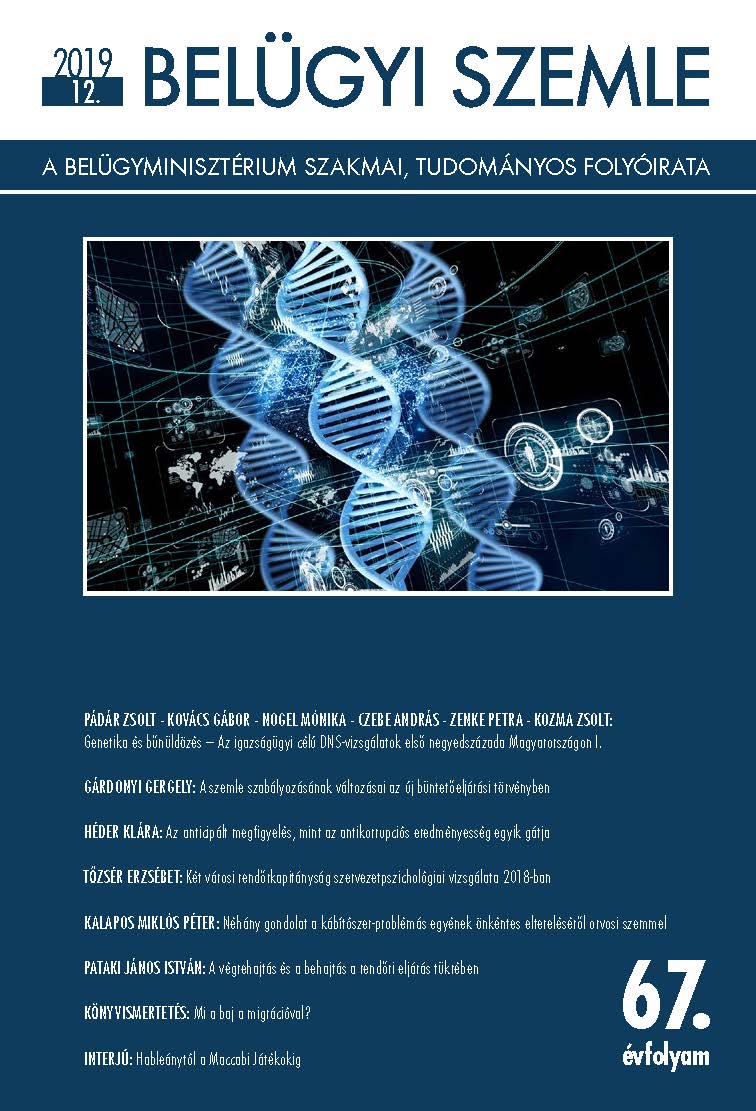Keywords
forensic DNA
DNA
forensic genetics
DNA
forensic genetics
How to Cite
Genetics and Law Enforcement - The First Quarter of a Century of Forensic DNA-testing in Hungary I. (2019). Academic Journal of Internal Affairs, 67(12), 7-34. https://doi.org/10.38146/BSZ.2019.12.1
Abstract
DNA profiling has become one of the most important and significant tools of criminal investigation. By proper use critical and decisive information can be provided about a perpetrator. Usage of DNA test results for forensic purposes began the 1990’s in Hungary. The aim of this study is to provide an overview of this eventful period. Due to its extent the paper is published in two parts. This first part presents the most important cases and the development of the technology.
Downloads
Download data is not yet available.
Similar Articles
- Zsuzsa Gyöngyvér Kovács, Involuntary treatment in mental institutions , Academic Journal of Internal Affairs: Vol. 62 No. 2 (2014)
- Ágnes Lehoczki, Donászi, Nagy and narcissism , Academic Journal of Internal Affairs: Vol. 62 No. 2 (2014)
- Bence Mészáros, How big cities can be made safer: an academic forum , Academic Journal of Internal Affairs: Vol. 62 No. 1 (2014)
- Zsolt Vas, Richárd Szongoth, Europol cooperation in Hungarian law enforcement , Academic Journal of Internal Affairs: Vol. 72 No. 9 (2024)
- Dániel Vetter, Experience of the Europol cooperation , Academic Journal of Internal Affairs: Vol. 72 No. 9 (2024)
- Gabriella Kármán, Scientific standards for forensic experts , Academic Journal of Internal Affairs: Vol. 61 No. 11 (2013)
- Csaba Fenyvesi, Global trends in forensic science in the 21st century , Academic Journal of Internal Affairs: Vol. 61 No. 10 (2013)
- Balázs Kollár, Theoretical and practical questions concerning eyewitness identification in the United States , Academic Journal of Internal Affairs: Vol. 61 No. 10 (2013)
- Melinda Hengl, Doctor of Sciences degree awarded to Csongor Herke , Academic Journal of Internal Affairs: Vol. 61 No. 6 (2013)
- Zoltán Benedek, The validity of DNA-examinations , Academic Journal of Internal Affairs: Vol. 63 No. 10 (2015)
You may also start an advanced similarity search for this article.
Most read articles by the same author(s)
- Gábor Kovács, Péter Gergely, Sándor Kosztya , Zsolt Kozma, Gábor Simon , György Szabados, Réka Anita Tóth, Klára Törő , Roland Weiczner , Recommendation. Key aspects of medical expert’s opinion (report) on the crime of driving under the influence of drugs (DRUID) , Academic Journal of Internal Affairs: Vol. 71 No. 7 (2023)
- Zsolt Pádár, Mónika Nogel, Gábor Kovács, Gergely Gárdonyi, Petra Zenke, Special Challenges of Wildlife Forensics in Hungary , Academic Journal of Internal Affairs: Vol. 70 No. 9 (2022)
- Zsolt Pádár, Gábor Kovács, Mónika Nogel, András Czebe, Petra Zenke, Zsolt Kozma, Genetics, Law Enforcement and Crime - The First Quarter Century of Forensic DNA- testing in Hungary II. , Academic Journal of Internal Affairs: Vol. 68 No. 1 (2020)
- Zsolt Pádár, Mónika Nogel, Gábor Kovács, Gergely Gárdonyi, Petra Zenke, Special Challenges of Wildlife Forensics in Hungary , Academic Journal of Internal Affairs: Vol. 71 No. 2.ksz. (2023): Special Issue
- Gábor Kovács, Forensic Sciences Under Siege , Academic Journal of Internal Affairs: Vol. 69 No. 10 (2021)
- Mónika Nogel, Guilty or Innocent? Relevance of Forensic Genetic Expert Opinions for the Defense , Academic Journal of Internal Affairs: Vol. 70 No. 3 (2022)
- András Czebe, Fuzzy logic behind forensic identity , Academic Journal of Internal Affairs: Vol. 68 No. 2. ksz. (2020): Special Issue
- Johanna Farkas, Gábor Kovács, Ernő Krauzer, Police corporate culture , Academic Journal of Internal Affairs: Vol. 66 No. 12 (2018)
- Mónika Nogel, Quality assurance for forensic expert-candidates , Academic Journal of Internal Affairs: Vol. 65 No. 9 (2017)
- Gábor Kovács, András Czebe, The role of cognitive and human factors in forensic expert opinions , Academic Journal of Internal Affairs: Vol. 65 No. 10 (2017)

